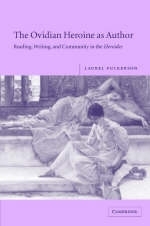
The Ovidian Heroine as Author
Reading, Writing, and Community in the Heroides
Seiten
2005
Cambridge University Press (Verlag)
978-0-521-84672-1 (ISBN)
Cambridge University Press (Verlag)
978-0-521-84672-1 (ISBN)
This works represents a new departure in the treatment of Ovid's Heroides, letters by women deserted by men. It portrays the women as agents rather than victims, employing textual strategies for their own ends. Combining traditional scholarship with recent criticism, it is required reading for any student of Latin literature.
Ovid's Heroides, a catalogue of letters by women who have been deserted, has too frequently been examined as merely a lament. In a new departure, this book portrays the women of the Heroides as a community of authors. Combining close readings of the texts and their mythological backgrounds with critical methods, the book argues that the points of similarity between the different letters of the Heroides, so often derided by modern critics, represent a brilliant exploitation of intratextuality, in which the Ovidian heroine self-consciously fashions herself as an alluding author influenced by what she has read within the Heroides. Far from being naive and impotent victims, therefore, the heroines are remarkably astute, if not always successful, at adapting textual strategies that they perceive as useful for attaining their own ends. With this new approach Professor Fulkerson shows that the Heroides articulate a fictional poetic, mirroring contemporary practices of poetic composition.
Ovid's Heroides, a catalogue of letters by women who have been deserted, has too frequently been examined as merely a lament. In a new departure, this book portrays the women of the Heroides as a community of authors. Combining close readings of the texts and their mythological backgrounds with critical methods, the book argues that the points of similarity between the different letters of the Heroides, so often derided by modern critics, represent a brilliant exploitation of intratextuality, in which the Ovidian heroine self-consciously fashions herself as an alluding author influenced by what she has read within the Heroides. Far from being naive and impotent victims, therefore, the heroines are remarkably astute, if not always successful, at adapting textual strategies that they perceive as useful for attaining their own ends. With this new approach Professor Fulkerson shows that the Heroides articulate a fictional poetic, mirroring contemporary practices of poetic composition.
Laurel Fulkerson is Assistant Professor of Classics at the Florida State University. She is the author of various articles on Latin and Greek poetry.
Introduction; 1. Reading dangerously: Phyllis, Dido, Ariadne, and Medea; 2. Reading the future: Hypsipyle, Medea, and Oenone; 3. Benefits of communal writing: Canace and Hypermestra; 4. A feminine reading of epic: Briseis and Hermione; 5. Reading magically: Deianira and Laodamia; 6. Reading like a virgin: Phaedra and Ariadne; 7. Caveat lector: thoughts on gender and power; Appendix A. The authenticity (and 'authenticity') of Heroides 15; Bibliography; Index; Index Locorum.
| Erscheint lt. Verlag | 14.7.2005 |
|---|---|
| Verlagsort | Cambridge |
| Sprache | englisch |
| Maße | 160 x 237 mm |
| Gewicht | 470 g |
| Themenwelt | Geisteswissenschaften ► Sprach- / Literaturwissenschaft ► Anglistik / Amerikanistik |
| Geisteswissenschaften ► Sprach- / Literaturwissenschaft ► Latein / Altgriechisch | |
| Geisteswissenschaften ► Sprach- / Literaturwissenschaft ► Literaturwissenschaft | |
| ISBN-10 | 0-521-84672-2 / 0521846722 |
| ISBN-13 | 978-0-521-84672-1 / 9780521846721 |
| Zustand | Neuware |
| Haben Sie eine Frage zum Produkt? |
Mehr entdecken
aus dem Bereich
aus dem Bereich
Poetik eines sozialen Urteils
Buch | Hardcover (2023)
De Gruyter (Verlag)
CHF 83,90
Buch | Softcover (2024)
belleville (Verlag)
CHF 27,95


